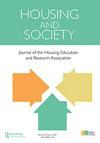Mortgage delinquency, foreclosure, and cognition in later life
Q2 Social Sciences
引用次数: 1
Abstract
ABSTRACT The rapid growth in housing insecurity among older adults is a major public health concern. While there is evidence that stress contributes to poor health, the relationship between housing-related financial stressors and cognitive functioning is relatively unknown. We investigated the association between the personal experiences of mortgage delinquency and foreclosure and cognition and its sub-components of episodic memory and mental status among Americans age 65 years and older. Using the data from two concatenated waves (2010, 2012) of the Health and Retirement Study, we analyzed data for respondents (N = 6,612) across both waves using generalized linear regressions. Our findings suggest that there is a negative association between mortgage delinquency/foreclosure and cognitive scores. Further, we found a negative association between mortgage delinquency and mental status among women, specifically. These results highlight the importance of financial well-being vis-à-vis housing stability and its significance to mental well-being and cognition of adults in later life. Future research is needed to identify macro-level stressors such as mortgage delinquency and/or foreclosure. Such information would improve strategies for prevention and intervention particularly for older adults living on fixed incomes who have little opportunity to earn pre-retirement levels of income.抵押贷款拖欠、丧失抵押品赎回权与晚年认知
老年人住房不安全感的快速增长是一个主要的公共卫生问题。虽然有证据表明压力会导致健康状况不佳,但与住房相关的财务压力源与认知功能之间的关系相对未知。我们调查了65岁及以上美国人的个人抵押贷款拖欠和丧失抵押品赎回权的经历与认知及其情景记忆和精神状态的关系。使用健康与退休研究的两个串联波(2010年和2012年)的数据,我们使用广义线性回归分析了两个波的受访者(N = 6,612)的数据。我们的研究结果表明,在抵押贷款拖欠/丧失抵押品赎回权和认知得分之间存在负相关。此外,我们还发现抵押贷款拖欠与女性心理状态之间存在负相关关系。这些结果突出了财务健康对-à-vis住房稳定性的重要性及其对成年人晚年心理健康和认知的意义。未来的研究需要确定宏观层面的压力因素,如抵押贷款拖欠和/或丧失抵押品赎回权。这些信息将改善预防和干预战略,特别是针对那些靠固定收入生活、几乎没有机会获得退休前收入水平的老年人。
本文章由计算机程序翻译,如有差异,请以英文原文为准。
求助全文
约1分钟内获得全文
求助全文
来源期刊

Housing and Society
Social Sciences-Urban Studies
CiteScore
2.30
自引率
0.00%
发文量
10
期刊介绍:
Housing and Society is the journal of the Housing Education and Research Association (HERA). The journal supports the mission of HERA by providing for the dissemination of research and other scholarly work. Submissions from a broad range of perspectives are encouraged. Topics in housing include: policy, design, social aspects, gerontology, behavioral aspects, energy/environment, equipment, interiors, economics, theory/model development, education, and program development or evaluation. The journal welcomes the submission of original research articles, notes and commentaries. Notes are shorter manuscripts presenting succinct information on housing related to one of the following categories: - Research: exploratory or not heavily theory-based or statistically analyzed - Academic: innovative teaching ideas - Program: development, implementation, and/or evaluation of Cooperative Extension or other housing programming efforts - Policy: examination of policy impact, comparative analysis, and/or need to achieve housing goals - Reviews: books, documentaries, etc.
 求助内容:
求助内容: 应助结果提醒方式:
应助结果提醒方式:


